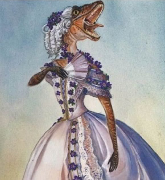|
HEY GUNS posted:annoyed at best Yes please. I know there was all kinds of fuckery inside Germany, from the Crown Prince marching to his own drum to the various states quibbling constantly with Prussia and each other pretty much from the unification through WWII, but I don't know much about the details. I assume it's the same petty bullshit that the VA Confederate states had during the ACW.
|
|
|
|

|
| # ? May 13, 2024 07:26 |
|
Randarkman posted:
Some of those would fit right in with art from the Mexican-American war. I'm looking at them on my phone, but the uniforms of the two sides even appear similar.
|
|
|
|
Cessna posted:The USMC is really good at doing well with comparatively little money (about 4% of the Defense budget)*. They have their own Air Wing, which is more adapted to giving close air support than their Air Force peers. They also have a really flexible organization which allows for the creation of units on an as-needed basis more efficiently than the army (MAGTAFs). I read somewhere that this figure is really skewed from the fact that the Marines piggyback on a lot of the Navy support structure, is that correct? Like, the Marine logistics trail is the responsibility of the Navy, so they get stuff without it appearing in their budget.
|
|
|
|
The US still does flags in combat, we just sewed them on to our uniforms. RE: Marine publicity, I know that in WWI one of the first US units to be combat-ready and see action was a Marine formation (IIRC a few battalions attached to a French unit), and they wound up getting out-sized coverage throughout the war in the US as a result, especially considering that by the time the Spring Offensive was under way there were orders of magnitude more Army guys getting shot at.
|
|
|
|
MANime in the sheets posted:The US still does flags in combat, we just sewed them on to our uniforms. We sewed them on in a way that civilians still give us poo poo about the flag being backwards on one shoulder o7. Maybe I've been drinking too much tonight but right not really seeing the Marines as being a waste of money. Yes, the F-35B is a loving clusterfuck on a level I can't really put into words, but honestly the last time the Navy and air force were forced to use the same plane it was also a clusterfuck so I'm not going to lay 100% of the blame on the Marines Corps. I think the ability to strike anywhere in the world within 24 hours with integrated air and sea support is a good capability to keep, at least with the kinds of wars the US has been fighting since the turn of the millennium.
|
|
|
|
Zamboni Apocalypse posted:
quote:Drinking tankard and earthenware pot; the stated rations for army facing Armada was two pounds of beef, two pounds of bread, a pound cheese and eight pints of beer This seems like a shitload of food for one guy.
|
|
|
|
^^ I think it is likely this number was used to make decisions about procurement and storage, but any supply chain has to take into account wastage due to handling damage, rats, and theft. If this is the case the soldier would only receive a portion of this amount.
|
|
|
|
Geisladisk posted:This seems like a shitload of food for one guy.
|
|
|
|
Don Gato posted:We sewed them on in a way that civilians still give us poo poo about the flag being backwards on one shoulder o7. When did they both use the same plane? I assume it was back in the 70s, my (admittedly sketchy) memory is that the Hornet and Tomcat are exclusively Navy/Marine and the F-15, F-16, F-22, and all the stealth planes are not able to do carrier ops. Heck, even in the late 30s they generally had different planes for carrier ops.
|
|
|
|
Don Gato posted:I think the ability to strike anywhere in the world within 24 hours with integrated air and sea support is a good capability to keep, at least with the kinds of wars the US has been fighting since the turn of the millennium. On a practical level, you'll always need a carrier group to tag along because the air component of something like gator freighters can't really even defend themselves by themselves. And since the turn of the millennium, the most notable conflicts have been the invasion of Afghanistan, Iraq and the air campaigns in Syria and Libya. Not really something you need a Navy's Army's Airforce for.
|
|
|
|
MANime in the sheets posted:When did they both use the same plane? I assume it was back in the 70s, my (admittedly sketchy) memory is that the Hornet and Tomcat are exclusively Navy/Marine and the F-15, F-16, F-22, and all the stealth planes are not able to do carrier ops. Heck, even in the late 30s they generally had different planes for carrier ops. Per Robert McNamara's demands, the F-111 was originally designed for use by both the Air Force and the Navy. The Navy version was never put into production, for a variety of reasons and the Air Force and Navy could only agree that their plane should be a two seater, two engine swept wing design and literally disagreed on every other point.
|
|
|
|
Don Gato posted:Per Robert McNamara's demands, the F-111 was originally designed for use by both the Air Force and the Navy. The Navy version was never put into production, for a variety of reasons and the Air Force and Navy could only agree that their plane should be a two seater, two engine swept wing design and literally disagreed on every other point. Cool, ty. I didn't know those stayed in service as long as they did.
|
|
|
|
meatbag posted:I read somewhere that this figure is really skewed from the fact that the Marines piggyback on a lot of the Navy support structure, is that correct? Like, the Marine logistics trail is the responsibility of the Navy, so they get stuff without it appearing in their budget. Yep. For example, every medic you see in a Marine unit is not actually a Marine, it's a Navy medic.
|
|
|
|
SeanBeansShako posted:I am seeing a lot of Prussian symbols on the flags too. To be fair, look at a map. Like half or more of Wilhelmine/Weimar Germany is Prussia. I'm guessing it's a similar dynamic to England v the UK.
|
|
|
|
More like navy equipment rides in my rear end 
|
|
|
|
Hunt11 posted:It is amazing just how much southern soldiers freaked out when they were stationed in places that didn't treat African Americans like human garbage. Or y'know Afro-Caribbean people. I've read about British pub landlords kicking good old boys out with prejudice who couldn’t handle sharing the bar with more melanin enhanced fellow members of the Empire.
|
|
|
feedmegin posted:To be fair, look at a map. Like half or more of Wilhelmine/Weimar Germany is Prussia. I'm guessing it's a similar dynamic to England v the UK. I am talking about post German Confederation German Empire here though.
|
|
|
|
|
SeanBeansShako posted:I am talking about post German Confederation German Empire here though. Me too? Hence Wilhelmine... https://en.m.wikipedia.org/wiki/German_Empire#/media/File%3ADeutsches_Reich_(1871-1918)-de.svg The blue bit is Prussia. It's huge.
|
|
|
But how much of that blue was populated?Geisladisk posted:This seems like a shitload of food for one guy. Remember this was before field kitchens were a thing and soldiers grouped up and pooled their food together to eat.
|
|
|
|
|
feedmegin posted:The blue bit is Prussia. It's huge. Some of that area was more recently Prussian than others, though, and not always particularly thrilled by that status. eta the word not. Epicurius fucked around with this message at 16:12 on May 12, 2018 |
|
|
|
I’m currently writing up an effort post that hopefully details where the constant bickering and political conflicts between Prussia and the rest during the Empire came from and how they fell out. I spend way too much time talking about pre-1871 though because that’s where my expertise is so you gotta deal with it
|
|
|
|
All of this loving rules, and there's also a lot of specific tactical/operational things the Russians did right and the Ottomans did wrong. Iirc some of the Russian cavalry actions just annihilated ottoman lines of communication and supply, but it's been years since I looked at this war.
|
|
|
|
In 1910 over half of the german population was Prussian.
|
|
|
|
MANime in the sheets posted:When did they both use the same plane? I assume it was back in the 70s, my (admittedly sketchy) memory is that the Hornet and Tomcat are exclusively Navy/Marine and the F-15, F-16, F-22, and all the stealth planes are not able to do carrier ops. Heck, even in the late 30s they generally had different planes for carrier ops. Besides the weird F-111 thing, they both used the F-4 Phantom, but I think that was an outstanding success for everyone.
|
|
|
|
glynnenstein posted:Besides the weird F-111 thing, they both used the F-4 Phantom, but I think that was an outstanding success for everyone. Both (and the Marines) used the Brewster Buffalo in WW2 as well. It wasn't a very good plane in US service, admittedly, the Zero made mincemeat out of it. It was, however, remarkably successful in Finnish service where it did quite well against Soviet aircraft.
|
|
|
|
glynnenstein posted:Besides the weird F-111 thing, they both used the F-4 Phantom, but I think that was an outstanding success for everyone. One difference was that the F-4 design had essentially already been finished for the Navy when McNamara told the Air Force to use it, rather than McDonnell trying to implement the requirements of both services early on. Though, the Navy had spent a lot of that time waffling on what the F-4 would actually do, so the result had a fair amount of versatility baked in.
|
|
|
|
HerraS posted:In 1910 over half of the german population was Prussian. This however includes territories annexed in the Austro--German War, you'd have to substract the population of those territories, since the population there barely had any time to develop a Prussian identity. The entire Kingdom of Hanover for example, that's quite a large bite the Prussians took and I'm fairly sure in 1910 most of the people there still saw themselves as Hanoverians, not as Prussians.
|
|
|
System Metternich posted:I’m currently writing up an effort post that hopefully details where the constant bickering and political conflicts between Prussia and the rest during the Empire came from and how they fell out. I spend way too much time talking about pre-1871 though because that’s where my expertise is so you gotta deal with it Go man go!
|
|
|
|
|
Cythereal posted:I'm not using racist propaganda as evidence. For actual evidence, take a read of The Fleet at Flood Tide by James D. Hornfischer. Who, for example, cites two companies of African-American army troops as being vital to the invasion of Saipan when those "support units" were among the first units to land on the Yellow beach landing sites and were critical in keeping the Japanese from overrunning the beachhead (p. 139-140). Well you only posted about racist propaganda with zero grounding in reality so don't blame me for reading it Those companies were absolutely support units, they were ammunition depot staff who picked up arms to repel a strong counterattack. They were instrumental sure, but they weren't a combat outfit and weren't likely to see combat again. The US military deliberately assigned African-American combat units to low-intensity areas in the Pacific, it was very different from Europe
|
|
|
|
Slim Jim Pickens posted:Well you only posted about racist propaganda with zero grounding in reality so don't blame me for reading it I'm not sure what point you're trying to make here. Every island invasion in the Pacific was high-intensity.
|
|
|
|
All those Poles and Rhinelanders were Catholic too, unlike ze Junkers
|
|
|
|
P-Mack posted:My grandfather was captured by black US troops, he used to joke that it happened at night and he couldn't see them coming. (Racist humor from a Luftwaffe veteran?!?!) This made me laugh, am I a bad person? I feel like the veterans involved would have also found this amusing.
|
|
|
|
aphid_licker posted:All those Poles and Rhinelanders were Catholic too, unlike ze Junkers 
|
|
|
|
Cythereal posted:I'm not sure what point you're trying to make here. Every island invasion in the Pacific was high-intensity. Yeah, and none of the African-American combat units were assigned to naval invasions in the Pacific. Rear echelon troops picking up rifles wasn't common or expected of them. Europe is where those combat units were actually assigned, and regularly saw combat.
|
|
|
|
Slim Jim Pickens posted:Yeah, and none of the African-American combat units were assigned to naval invasions in the Pacific. Rear echelon troops picking up rifles wasn't common or expected of them. Europe is where those combat units were actually assigned, and regularly saw combat. African-American support units weren't rear echelon. The African-American companies at Saipan were beachmaster companies - part of the second line to secure and consolidate the beachhead and set up operations for receiving bulk transport of troops and supplies. That wasn't the first wave, but hardly a rear quarters support role.
|
|
|
|
meatbag posted:I read somewhere that this figure is really skewed from the fact that the Marines piggyback on a lot of the Navy support structure, is that correct? Like, the Marine logistics trail is the responsibility of the Navy, so they get stuff without it appearing in their budget. Sort of, but so does everyone. The Army Airborne, for example, gets their rides from USAF planes. MANime in the sheets posted:When did they both use the same plane? I assume it was back in the 70s, my (admittedly sketchy) memory is that the Hornet and Tomcat are exclusively Navy/Marine and the F-15, F-16, F-22, and all the stealth planes are not able to do carrier ops. Heck, even in the late 30s they generally had different planes for carrier ops. Everybody used the F-4 Phantom back in the 70s. Edit: Glynnenstein beat me to it.
|
|
|
|
MANime in the sheets posted:Yes please. I know there was all kinds of fuckery inside Germany, from the Crown Prince marching to his own drum to the various states quibbling constantly with Prussia and each other pretty much from the unification through WWII, but I don't know much about the details. I assume it's the same petty bullshit that the VA Confederate states had during the ACW. Okay, this got way longer than I initially intended. I wanted to spruce it up a bit with pictures and whatnot but then I realised the Eurovision is on, so I fear that you’re on your own now!  So, Germany has a long federalist history going all the way back to the early HRE. Various attempts by the Emperors to enforce central rule fell short every time, and both the eventual tripartition of the Empire along denominational lines and the other European powers playing watchdog so that no unified Germany would ever emerge made sure that things stayed that way. Cue to the last seven decades of the HRE. After the accession of the throne in 1740, Frederick II pretty much kickstarted a Cold War between Prussia and Austria that every now and then also would turn hot; Protestant Prussia and Catholic Austria suddenly competed fiercely over power and influence in Germany, something whis hadn't really happened before where Austria had been the predominant power within the HRE for centuries. This was especially bad for the so-called "Third Germany", i.e. the innumerable other and smaller principalities and territories other than the big two, ranging from middle powers like Bavaria to things like the Imperial Valley of Harmersbach, where about 2000 peasants let themselves be governed by a literal innkeep. Much like the unaligned world during the 20th century Cold War, navigating the political minefield that now existed was both a huge opportunity (by securing political, military or financial support by one of the great powers) and a huge risk (by getting on the wrong side of one of the powers and getting invaded) for those smaller powers, who nevertheless as a general tendency were more likely to side with the Hapsburgs, mostly because Frederick didn't give two shits about the intricacies of the complex political framework that was the HRE, whose rules and traditions, at least in theory enforced by the Hapsburg Emperor, were in many cases the only things saving the smaller territories from getting swalloped up. One of their defence mechanisms was developing a strong "national" identity. It is this time and the political and cultural context of the 19th century, where German federalism and its multitude of highly localised identities really came into being. The most powerful amongst the "Third Germany" was Bavaria, a country which shared much of its culture, going from religion to language to cuisine with its Austrian neighbours, which was the reason why its rulers felt especially threatened by Austrian expansionism. There were a lot of political intrigues and outright war between the two of them, and more than once the Wittelsbachs and the Hapsburgs almost reached a deal where they would exchange the Austrian Netherlands for Bavaria, which however due to Prussian and French fuckery never went through. This precarious situation is one of the main reasons why Bavaria developed an especially strong local identity; the second-most powerful "Third Germany" states were Saxony and Württemberg, which for various reasons needn't worry as much about being absorbed into a culturally similar and much more powerful neighbour. This situation endured even after the end of the HRE. Even though a ton of tiny principalities and imperial/ecclesiastical territories had been absorbed by various larger powers, the German Federation still consisted of 41 different states, and the conflict between Austria and Prussia still simmered on. The emerging romantic movement talked and wrote a lot about a mythical past and the importance of being connected to the soil you lived on, which was an important factor in further driving and shaping local identities, as was international tourism, which began to gather real economic importance especially in Bavaria and the Rhineland from the 1850s on. Nationalism was all the rage, and this didn't only affect the rising desire to unify all Germans in a common nation state, but also reinforced said local identities and "patriotisms". Bavaria had the added problem of having to construct a new overarching national mythos and identity after it had absorbed lots of culturally quite different areas in the wake of the Napoleonic wars, namely parts of Swabia and Franconia. There's a last point I need to talk about here, and that's religion. While religious conflict had been almost fully channelled into passive-aggressive bickering and legal quarrels after 1648, the cultural gap between Catholicism and Protestantism grew ever wider during the 18th century, wider than it had ever been before. During the late 18th century, this changed however, when Prussia took on the mantle of the leading Protestant power from Saxony, which was close to Austria politically speaking and had never had the ability or the interest to get offensive when it came to religious matters. Prussia however infused the political conflict with Catholic Austria with a religious aspect, most visible during the Seven Years' War which was styled by Frederick's propagandists as a war for Protestant survival against Catholic onslaught. This religious conflict reached a new level during the 19th century, when in the wake of the trauma of 1789 and secularisation, the Catholic Church went anti-modernist, and it went hard, with e.g. Pope Gregory XVI condemning liberal ideas like freedom of press, freedom of thought, gas lamps and railroads. Another facet of the intra-Catholic development was the effort by clergy and laity alike to create a strong and united Catholic front against any perceived threats from the outside; this gave rise to "ultramontanism", i.e. the idea that all Catholic life was international in nature with the Pope as its global centre. Early conflicts between Prussia and the Church came to a head during the so-called "Cologne Confusions", when Prussian forces in the freshly annexed Rhineland arrested the archbishop of Cologne. This created for a large uproar amongst German Catholics and was an important factor in them permanently identifying Prussia as the enemy, an impression which didn’t get better when Bismarck immediately tried to crush the Catholic Church in Germany after 1871. Okay, we're finally getting to the second Empire. Through a bunch of shrewd political moves and three bloody wars, Bismarck managed to not only throw Austria out of Germany, but also to definitely establish Prussia as the dominant political power in Central Europe by crushing the militaries of all other German powers. Amongst pan-German nationalist circles there was a great deal of joy when a German nation state finally became reality in 1871 (even though Austria's absence continued to be a sore point), but in those smaller territories to Prussia's south, the mood was much more subdued. Nationalist verve and the dynamics of the unfolding political situation had forced their hand, but due to Catholic worries about Prussian dominance and the strong local identities that had emerged in the meantime, many people were highly critical of the new Empire. Even then, Bavaria almost refused to stay out of it, and Bismarck had to pretty much bribe King Louis II with enormous amounts of money to accept the incorporation into a Prussian-led Empire. Even though the letter which formally asked King Wilhelm I of Prussia to take the Imperial Crown was written by him on behalf of the other German states afterwards, Louis still absolutely hated it and refused to attend the coronation festivities, sending his younger brother Otto instead, who wrote from Versailles: Letter from Prince Otto to his brother Louis II, February 2nd, 1871 posted:O Louis, I can't begin to describe to you how immeasurably sad and painful this ceremony was for me, how every fibre of my being shuddered and revolted at what I had to see. It did, after all, go against everything for what I burn and which I love and dedicate my life to [...] Such a sad sight it was, seeing our Bavarians bowing to the Emperor; my heart wanted to break. Everything so cold, so proud, so pompous and ostentatious and heartless and empty [...] He wasn't alone in this; many Catholic peasants resented the new Empire, and I remember reading about cases where people outing themselves as pro-Prussian in Bavarian inns during the months after the coronation were likely to get a good thrashing. Protestants however mostly rejoiced at the new Empire, which for the first time in German history represented an Empire in which Protestantism was the dominant religion. This is also why it was mostly Bavaria where resentment was the highest, because both Saxony and Württemberg were majority Protestant. As part of the deal Bismarck prepared for the larger German states outside of Prussia, he negotiated various “reserve rights” with them. They varied depending on which state you were talking about. They were the most extensive in the case of Bavaria (no surprises there) and consisted out of a permanent vice presidency in the Bundesrat, its own post office, its own rail agency, its own diplomatic service outside of the Empire, and – probably the most interesting thing itt – its own standing army, and what more: The king got to remain commander-in-chief during times of peace. This wasn’t a given, seeing as the commander-in-chief of the armies of Saxony and Württemberg was the Kaiser, with the respective kings only being designated “Chef” (basically “boss” or “director”) of them. Louis II never really felt happy in the new Empire, however. The feeling of having been robbed never left him, and his mounting mental issues didn’t help. He had his last public appearance in 1876 and receded into privacy, until he was declared mentally unfit to rule by his own cabinet in 1886 and died a mysterious death in the depths of Lake Starnberg soon afterwards (there are still quite a lot of people in Bavaria who maintain that it in fact had been a Prussian plot to assassinate him). His formal successor was his younger brother Otto, but as he had lost his marbles in the meantime too and spent his days tucked away in a secluded palace far away from the public eye, the actual successor was their uncle, Prince Regent Luitpold. Luitpold was far more amicable towards Prussia: Even though he had fought and lost against them during the war of 1866, he realised that the Prussian army was far more capable than the Bavarians and dedicated his later military career into reorganising the Bavarian army after the Prussian ideal. It was no surprise then that he worked as Bavaria’s representative at the Prussian military command during the German-French war. He never expressed too large an interest in politics and mostly appointed ministers that were sympathetic to Prussia. His unwillingness to seek conflict might be expressed in the fact that in 1890 he refused to host a Catholic convention in Munich, something which many of his subjects would have welcomed but which the Prussian government rejected. Still, the relationship between Berlin and Munich never became really warm, probably also because Luitpold was forced to acknowledge the continuing negative sentiment amongst many of Bavaria’s Catholic lower and middle classes. This was for example reflected in the grand architecture of several large-scale building projects connected with the Bavarian reserve rights, e.g. the army museum or the ministry of transport. Luitpold’s successor, his son Louis III, continued this ambivalent stance. While he wholeheartedly supposed Wilhelm II after 1914, domestically he had close ties to the Catholic Centre party, which wasn’t particularly well liked in Berlin, and his grand plans for Bavarian expansion after a victory in the war were less the ramblings of someone who drastically overestimated his own position but more the attempt to avert an even more powerful Prussia after said victory. I’m not too sure about the other German princes, honestly. The Saxon kings were in a precarious situation because they themselves were Catholics ruling over a deeply Lutheran country, which occasionally led to domestic unrest and meant that they couldn’t go against Prussia too much. I know that King John (reg. 1854-1873) had been a proponent of a “Greater German solution”, i.e. a German nation state including Austria. King Charles of Württemberg (reg. 1864-1891) officially represented an anti-Prussian policy in the years before 1871, but it was an open secret that he was privately a friend of Prussia (much like it was an open secret that he had a gay love affair with an American he later ennobled under the title “Freiherr von Woodcock-Savage” which actually made sense and wasn’t the world’s most unsubtle innuendo but still, lmao). His nephew William II tried to distance himself from Kaiser Wilhelm, mostly because the Kaiser’s raving hard-on for everything military was seen as unsavoury and unbecoming. It’s also remarkable that William allowed the 1907 International Socialist Congress to take place in Stuttgart, which might also have been a subtle jab at Berlin. The opinion of the common people always depended greatly on their own social standing, their religiosity and where they lived. Many Catholics both outside and inside of Prussia remained wary of Prussian dominance, and in return mostly Prussian Protestants emphasised that Germanness and Protestantism were one and that Catholics were second class citizens at best. While throughout the years and decades this rivalry slowly subsided as people got used to living in the Empire, it never really vanished altogether. It was especially the southern Protestant bourgeoisie that identified with Prussia and the German Empire the most, whereas Catholics and the lower classes were more likely to emphasise their local cultural identities that often were partially based on anti-Prussian sentiments, too. I honestly have no idea about how all this expressed itself during WW1, though. I know that there was the occasional bickering between e.g. Bavarian and Prussian officers, but I can’t really say anymore. Does anyone here know?
|
|
|
|
oXDemosthenesXo posted:Are there any books out there about what foreign observers learned from the ACW? Wasn't Engels an observer for the war? Koramei posted:and even in Japan itself there was stuff like people using shibboleths to try to root out ethnic Koreans so they could murder thousands of them in the wake of the Great Kanto Earthquake. Hell of a time to discover you've got a anxiety triggered speech impediment As for the rest I haven't been living entirely under a rock and I'm def familiar with Japanese crimes :-P Cessna posted:You can either join to be a SEAL or transfer over from another MOS. Well yeah, weren't you a marine? Is it open to them too? Milo and POTUS fucked around with this message at 20:58 on May 12, 2018 |
|
|
|
System Metternich posted:The Saxon kings were in a precarious situation because they themselves were Catholics ruling over a deeply Lutheran country, which occasionally led to domestic unrest and meant that they couldn’t go against Prussia too much. ... However, unlike some other German powers, Saxony's administrative documents were well-integrated with Prussia's during ww1. This is a problem because many Prussian documents are now lost.
|
|
|
|

|
| # ? May 13, 2024 07:26 |
|
13th KRRC War Diary, 12th May 1918 posted:In the afternoon the advanced parties of the 13th Rifle Bde. came up and reconnoitred the postition prior to taking over.
|
|
|































